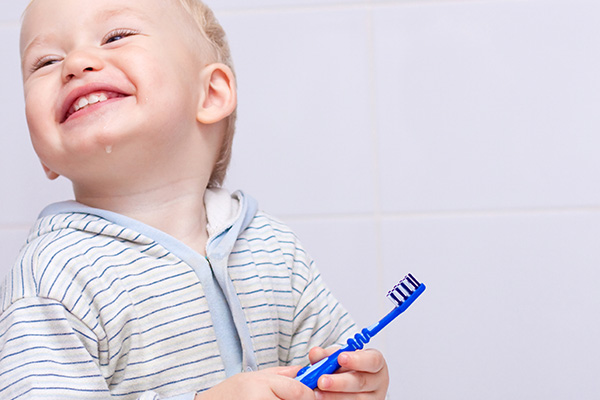Pediatric Dentistry: Infant Teeth Health FAQs

As your child begins to grow their first teeth, you may have some questions about pediatric dentistry. For example, you might be wondering why a child’s baby teeth are so important. You may also be wondering how you can care for your infant’s teeth. Read on to learn more.
Are an infant’s teeth that important?
There are many reasons why baby teeth are important. As the teeth grow in, they can help children learn to speak, as well as eat solid foods. The baby teeth also pave the way for adult teeth in later years. Parents should remember that oral health is about more than the teeth.
If a baby’s tooth gets a cavity, the infant will be extremely uncomfortable. An infection also enters the blood and causes other health issues. The bacteria from an infection can also move to another part of the child’s mouth and cause more infections. The adult teeth can become infected as well.
When does teething start?
Teething happens when the teeth burst through the gums. Usually, a child’s teeth will start to grow around four months. However, some children’s teeth may not come in until the children are a year old. Genetics will play a role.
When should a parent begin using toothpaste?
In pediatric dentistry, it is better to start using toothpaste as soon as possible. Parents can use an infant toothbrush to clean the gums as soon as the child is born. Once the child’s teeth come through, parents can start using a tiny amount of fluoride toothpaste. This can help strengthen the teeth. Infant toothbrushes are softer and smaller for a baby’s sensitive mouth.
What type of fillings are used for infant teeth?
Even with good care, a child can still develop cavities. To treat the cavities, a dentist can use white fillings. These fillings match the natural color of the teeth. Usually, the fillings are made out of composite resin. Unlike amalgam fillings, these do not contain mercury.
Mercury-free fillings can be healthier for the child. A composite resin filling can also help prevent tooth sensitivity. It protects the tooth because not as much tooth needs to be removed to place the filling. This type of filling will bond to the tooth better than an amalgam one would.
Can an infant have a dental emergency?
A child of any age can have a dental emergency. This can include a fractured, broken or chipped tooth. An extremely painful toothache is another type of dental emergency. Visiting a pediatric dentistry practice immediately is vital in a dental emergency. However, if a child has a very severe issue, the emergency room may be the better option.
Visit a pediatric dentistry practice today
A child should go to a pediatric dentistry practice by the age of one. This will allow your child’s teeth to be cleaned. You can also ask the dentist all of your questions about the health of your infant’s teeth. Making an appointment today can help you get on track with your child’s oral health.
Request an appointment here: https://www.canyonridgepediatricdentistry.com or call Canyon Ridge Pediatric Dentistry at (303) 841-7900 for an appointment in our Parker office.
Check out what others are saying about our services on Yelp: Read our Yelp reviews.
Related Posts
Kids dentists are pediatric dentists dedicated to providing foundational oral care to children. Some will see children as young as 12 months up to teenagers. We understand children may be a bit anxious about their first dental appointment. However, there are steps parents can take to help ease their child into a dental care routine…
Choosing a kids dentist is an important decision for parents. This dentist will impact the child's dental health for years to come. Both family and pediatric dentists are well suited to treat kids, but which is right for your child? Here are some important things to consider when choosing a kids dentist.A family dentist is…
Finding the right kids dentist is one of the most important decisions you can make for your child's health. This dental professional ensures they have a healthy smile while creating a positive experience that can set the tone for future dental visits. Here are some essential tips to help you choose the right kids dentist…
Finding a good kids special needs dentist is crucial, as it determines how well the child's dental experience will go. When it comes to a child with special needs, there is extra care and patience involved, which is why it is so important to find a good fitting dentist. Thankfully, there are a few things…
